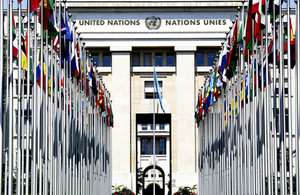35th Universal Periodic Review: UK statement on Kiribati

The Universal Periodic Review takes place in Geneva.
The United Kingdom welcomes Kiribati’s [pronounced Ki-ri-bass] continued engagement with the UN human rights system and we acknowledge capacity constraints in Kiribati, as a Small Island Developing State, including a geographically dispersed population, and climate change threats.
The UK recognises Kiribati’s progress since its 2015 review, including ratifying the Convention Against Torture and the Convention on the Rights of Persons with Disabilities. We encourage Kiribati to take steps to reduce the reporting backlog on ratified treaties, such as the Convention on the Elimination of all Forms of Discrimination Against Women and the Convention on the Rights of the Child.
The UK recognises Kiribati’s efforts to prevent gender-based violence. We remain concerned that there are inadequate measures to change social norms, support victims and facilitate redress of such crimes.
We welcome working with Kiribati on scoping a National Human Rights Institution via the South Pacific Community’s Pacific Commonwealth Equalities Programme.
We recommend that Kiribati:
-
Establish a National Human Rights Institution in a timely manner and in line with the Paris Principles, using expertise from regional and UN bodies as necessary;
-
Criminalise human trafficking in line with international standards, including recognising that human trafficking may occur within State borders;
-
Implement the Family Welfare Act 2013 and the National Approach to Eliminating Sexual and Gender-Based Violence Action Plan to improve access to essential services for violence survivors, embed measures to change social norms, and facilitate redress such crimes.
Published 30 January 2020
